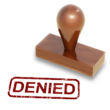Can I Be Denied Disability Benefits if I Can’t Do the Job I’ve Always Done?
September 5, 2023
Many disability applicants are astonished when they learn they have been denied disability insurance benefits, even though the Social Security Administration (SSA) has agreed that due to disabling injuries or illnesses, they are unable to perform the tasks required in any of their past jobs.
When considering your application for disability benefits, Social Security will assess your “residual functional capacity,” or RFC, to determine if there’s any type of work you’re able to perform given the limitations caused by your condition, your age, your education, and your work experience.
If the SSA determines that you’re unable to do any work on a consistent and reliable basis—including but not limited to types of jobs you may have held in the past—you may be approved for benefits.
However, the majority of initial applications are denied. Last year in Illinois 6 out of 10 initial applications were denied. Many of the denials were because Social Security ruled that although disability applicants could not return to their previous jobs, they could perform some alternate kind of work.
Nash disability attorney Kevin Lichtenthal offers some examples. “Let’s say you worked as a janitor and your work involved lifting items weighing as much as 75 pounds, but now due to a back injury you just can’t do that anymore. The SSA may say you could be a night janitor. Or maybe you were an ER nurse but are unable to do that job now. The SSA might say you can be a telephonic nurse. Even if you’ve worked most of your life in a heavy, physically demanding occupation like construction, Social Security may find that you don’t have a qualifying disability because you can do some unskilled, sit-down job.”
If you apply for Social Security Disability benefits and are denied, you have the right to an in-person hearing to appeal that initial decision.
Vocational experts play a significant role during an appeal hearing. Their testimony can be a deciding factor in your disability case. A vocational expert (VE) is a paid expert witness hired by the Social Security Administration and will be present at almost every disability hearing.
The vocational expert is presumed to have knowledge of and experience with job trends and local labor market conditions. They are supposed to provide an impartial expert opinion. But as Lichtenthal points out, “In our experience with hundreds of disability appeal hearings, we have found that vocational experts are not always impartial, and they are not always experts.”
The VE must determine whether there are any jobs you could still work despite your impairments.
To find such jobs, the SSA uses a guide known as the Dictionary of Occupational Titles (DOT). If there is a job listed in the DOT which the VE testifies that you could do, then you will be denied benefits.
The most glaring problem with using the Dictionary of Occupational Titles is that it has not been updated since 1991. In the past three decades many of the jobs in the directory have become obsolete, outsourced, offshored or automated. (Just think of how technology has changed our lives in recent years. An example is that there were no iPhones until 2007.)
Lichtenthal offers these examples to demonstrate how of out-of-date the DOT is. “You have disability claimants being denied because a VE says they could work as a ‘document preparer,’ or an ‘envelope stuffer,’ or as a ‘nut sorter’ (a person who observes nut meats on a conveyor belt and picks out broken, shriveled, or wormy nuts), or as a ‘telegraph service rater’ (a person who counts numbers of words in telegrams and assigns rates). In the real world there is little to zero demand for such workers.”
“As you can see, winning a disability hearing is not as simple as showing up and explaining your medical problems; it’s not enough,” Lichtenthal says. “You need someone with the expertise to challenge vocational experts. Therefore, it is worthwhile to have a disability lawyer in your corner with significant experience to review your claim and offer you the best possible advice and a winning strategy for your unique situation.”
Contact us at Nash Disability Law Chicago for a free evaluation of your disability claim. We are here to help you get the benefits you deserve. We only get paid if you win your case.


